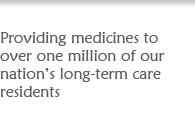|
Return and Reuse of Nursing Home Drugs
Background/Current Law and Regulations: Some states require long-term care (LTC) pharmacy providers to accept and process unused nursing home drugs for credit to the state Medicaid agency. The regulations that implement this policy vary from state-to-state and are further limited by Drug Enforcement Agency (DEA) and Food and Drug Administration (FDA) guidelines, as well as state boards of pharmacy regulations.
As state budgets come under increased pressure we expect states to look more closely as implementing return and reuse policies, either by regulatory action or by statute.
The vast majority of states make no distinction between LTC and retail pharmacies in their reimbursement policies in of the Medicaid program. However, retail establishments have long been exempt from any requirement to accept unused drugs because of the absence of any verifiable chain of custody and assurance that the drugs have not been adulterated. This makes LTC pharmacy the only entity to which return and reuse regulations apply.
Rising prescription drug costs over the past several years have brought renewed attention to the issue of drug waste in nursing facilities. LTC pharmacy is in a position to help eliminate much of this waste and return savings to the Medicaid system and other customers. However, this service is not without significant cost, which must be recognized and compensated if all parties are to be fairly served.
LTCPA Principles for Return and Reuse of Unused Nursing Home Drugs
-
Processing drug returns costs more than dispensing: Contrary to popular belief, processing returned drugs is not simply dispensing in reverse. The process by which drugs are processed for return and credit consists of several elements that differ from the process of dispensing.
- Pharmacies receiving inventory from wholesalers and manufacturers track inventory largely through automated processes. Returned drugs require manual counting and documentation by trained pharmacy staff.
- Returned drugs must be inspected by a qualified pharmacist to determine which drugs are suitable for return. Drugs deemed unsafe must be inventoried, destroyed, and the destruction must be documented.
- The reimbursement status of the person for whom the unused drugs were originally dispensed may not always be clear. Often, the dispensing pharmacy may not know to whom the services are to be billed until the month following the period in which the drugs were dispensed. Currently, these determinations must be performed by trained staff using manual processes in order to determine the payer to whom the credit should be issued.
- Dispensing prescription drugs is tracked by the pharmacy by automated computer systems. Processing a returned drug for credit requires manual tracking because the original claim must be located, reversed, adjusted and re-billed. There is no clear record of the credit. An electronic return credit transaction in the NCPDP format should be established to meet the current HIPAA Transactions Code Set requirements.
- LTC pharmacies are generally high-volume enterprises, processing thousands of prescriptions per day. In order to accommodate the additional task of processing credits, the LTC pharmacy may need to be re-designed.
- Re-stocking fees must be adequate to cover the additional costs: A re-stocking fee, like a dispensing fee, is intended to cover the professional costs of providing service. As such, the re-stocking fee must be adequate to cover the cost as described above.
- Credits should be limited to high-cost drugs: Because of the high cost of processing unused drugs for credit, mandatory returns should be limited to a small number of high cost drugs for which the process produces meaningful savings.
- Returns should be limited to full cards or original unit dose packages: The process of stripping unused medicines from heat-sealed cards and reassembling them into new heat-sealed packages violates current United States Pharmacopeia (USP) guidelines and has the potential to compromise product integrity.
- Claims reversal should be done through batch processing: Claims reversals should be performed in a manner that promotes efficiency. Rather than require pharmacies to access the original claim, reverse, adjust, and re-bill the claim reflecting the credit, a system that accommodates batch processing of returns needs to be developed. Electronic coding standards required by HIPAA currently contain no codes for issuing a credit to any payer. We recommend that states not implement mandatory return credits until the coding system can accommodate an efficient procedure.
- States should permit seven-day initial fills upon nursing home admission: The majority of medication adjustments for nursing home patients occur within the first week of admission to the facility. By limiting the dispensing of drugs to smaller quantities during this period, there will be less waste to process, resulting in savings to the Medicaid program. The LTC pharmacy should not be bound by a limit on the dispensing fee for subsequent refills during this period.
- States should provide regulatory guidance through the board of pharmacy: The limitations on the types of drugs eligible for return credit should be subject to the professional oversight of the state board of pharmacy for such obvious limits as:
- Pharmacies must not be required to return refrigerated drugs, drugs that are potentially adulterated, controlled substances and drugs that are within 120 days of labeled expiration date.
- Pharmacists must be empowered to use their professional judgment in determining which drugs are acceptable for re-packaging and return to stock.
- Drug returns must be returned only to the dispensing pharmacy, in tamper-evident packaging, where information is available to identify products that have been recalled and when stored and transferred properly by the nursing facility
1 USP-NF, Section 1146 “Packaging Practice – Repackaging a Single Oral Drug Product into a Unit Dose Container.”
|


